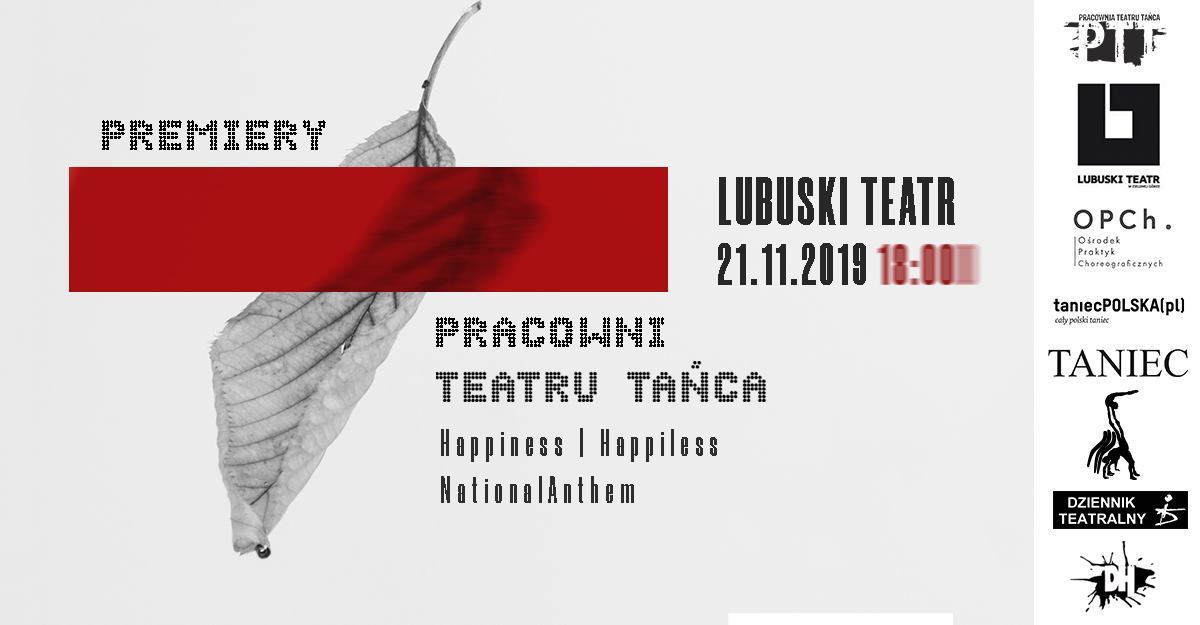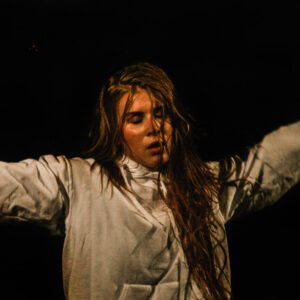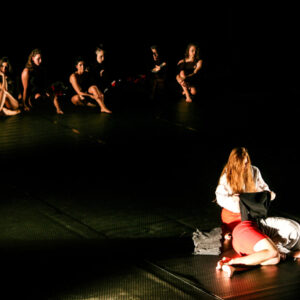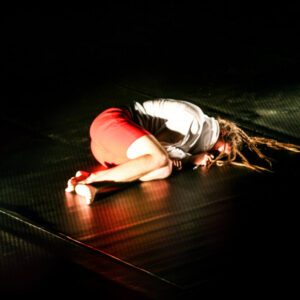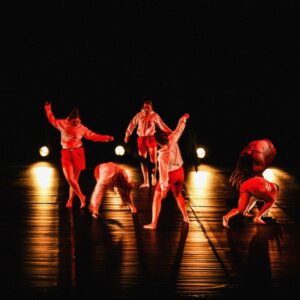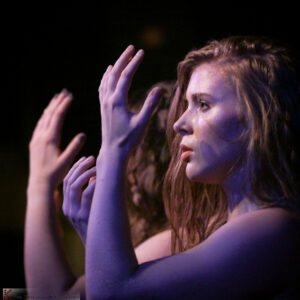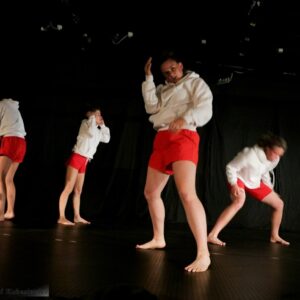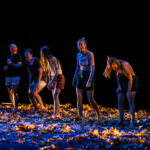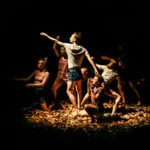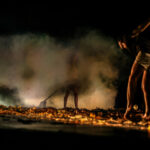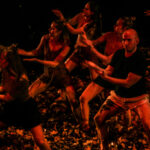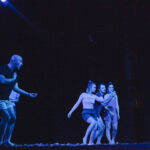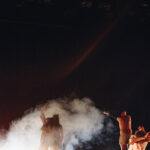Made to measure
"National Anthem"; "Happiness / Happiless" - Dance Theater Studio in Zielona Góra
On Thursday (November 21), the Dance Theater Studio in Zielona Góra presented two new original performances at the Lubuski Theater. The screening was part of the Prime Minister's Evening, hosted by Marta Pohrebny in an interesting way. As previously announced, I decided to go to Zielona Góra to see for myself how the dancers from the team are doing today, which we named one of the most promising independent theater groups in the summary of the 2016 artistic season. Now I am returning to you with a short account of this event.
In the land of the black rainbow
The evening was opened by the performance 'National Anthem' directed and danced by the duo of Marek Zadłużny and Radosław Bajon. On its motto, the authors chose a quote from the song Mister D. (Dorota Masłowska) referring to the history of the famous rainbow in Plac Zbawiciela - the object of repeated attacks by nationalists for whom setting the installation on fire has become a kind of ideological ritual - and the piece itself turned out to be adequate (although not the only) musical background of the story. In National Anthem, dancers (Radosław Bajon and young students of the Pracownia: Karolina Gruca, Agata Hałubicka, Maja Kordek, Zofia Berlikowska, Julia Perzyńska, Magdalena Dobek, Kacper Rampold) show the routine activities that we perform every day. It quickly becomes clear that washing, vacuuming, shopping,professional or family duties and prayer (as if tapped out of habit, because it is not dependent on the state of mind) are a plane of understanding for the characters; they make them look like each other. The same cannot be said of national holidays and patriotic symbolism. When the dancers put on white and red costumes, their characters gain a new face. A temporary "change of decoration" is enough to make radical divisions between them. Identical black towels quickly sprout in their hands, with which they cover their eyes as blind fanatics, and in a moment turn them into symbols of black spreading around - a contrast for individualism, color and otherness that needs to be eradicated. Extremely emotional arrangement, perfectly reflecting the brutality of the attack on those who "did not fit in the line",however, it is gradually extinguished by returning to its original context. The dust of battle descends, revealing the aggressor from whom a moment ago was beating a blind fury, who now carefully folds the scattered towels, forming a neat pile of them, for now the hate festival is over and she can again play the role of the perfect housewife.
The right clash of two - almost alternative - realities that actually coexist on one ground today gives you shivers! He emphatically reminds viewers that Poland is a country of paradoxes, in which the self-identification of an individual in a given place and time is not due to the "neutral" elements constituting the national identity (such as language, cultural heritage, symbols, places of remembrance or the community of historical experiences), but above all circumstances. "In the land of the black rainbow", where national values flow in one melting pot with fanatical ideologies, we are all a great family until someone calls out: "The one with us! The one against us! ".
Mortally happy
The second of the performances presented during the Evening of Prime Minister of Pracownia is 'Happiness / Happiless', directed and danced by all members of the repertoire group (Magdalena Bębenek, Agata Smolich, Kalina Grupa, Natalia Hass, Agata Dąbrowna, Marek Zadłużny, Radosław Bajon and Gabriel Zaborniak). The performance, with a telling title, suggesting that we are doomed to an alternative - being happy or being unhappy - was built around this dichotomous axis. The scene inaugurating them shows the characters as people who live close to nature, in harmony with their primal instincts. In a short sequence of consecutive, painterly and very dreamlike pictures (taken somewhat from Schulz, and a bit from the intersection of Chełmoński and Bosch's works),which one would like to call the "Autumn Night's Dream", we see dancers drowning in a flood of colorful leaves. They seem to be enchanted by their spell, preparing their bodies and minds for winter sleep by participating in a mysterious, autumn mystery. calm, reconciled with each other and with the whole universe, they symbolize the representatives of the world to which there is no return.These are people from centuries ago - children of nature and order, living in accordance with the rhythm imposed by it, understanding the processes taking place in it, but most of all being able to perceive and unpack the gifts she generously bestows on them.Immersed in some kind of ecstasy, and at the same time calm, reconciled with each other and with the whole universe, they symbolize the representatives of the world to which there is no return. These are people from centuries ago - children of nature and order, living in accordance with the rhythm imposed by it, understanding the processes taking place in it, but most of all being able to see and unpack the gifts that she generously gives them.Immersed in some kind of ecstasy, and at the same time calm, reconciled with each other and with the whole universe, they symbolize the representatives of the world to which there is no return. These are people from centuries ago - children of nature and order, living in accordance with the rhythm imposed by it, understanding the processes taking place in it, but most of all being able to see and unpack the gifts that she generously gives them.
Unexpectedly, the sounds of "Bohemian Rhapsody" wake the heroes from their ecstatic sleep and take them straight to the land of chaos, that is, to modern reality. Here they fall into a whirlwind of hedonistic fun. They go crazy on the dance floors of clubs, shine at social meetings and social media, and on their faces the inseparable smiles are painted. Because you have to. Because they have to constantly provide the environment when they have a good time. But from one extreme it is easy to fall into the other. The lack of emotional balance leads from euphoria to loneliness, depression and further - to self-destruction. is it just going to die before the fun is over?
In the last scene - just like in the old Tove Lo music video for the song "Stay High" - viewers can see what happens to the characters when the party ends, the mirrored specks of disco balls stop discreetly slipping over their skin, and all that powder and glitter runs off from their faces along with the evening shower. Naked (not only figuratively), deprived of the audience in the form of prying eyes of friends, they turn out to be helpless, defenseless and painfully lonely. They are unable to face emotions other than hysterical joy. Marino Marini's hit "Don't cry when I leave ", accompanying the dramatic final scene, in which one of the characters is thrashing among the leaves, plunged in dry suffering without tears, sounds in this context like a cynical commentary.
'Happiness / Happiless' touches on the very current issue of the search for happiness, which has unexpectedly grown from an age-old dream and a natural striving of humanity to the rank of a true obsession. In the past, it was believed that we mark our path to happiness by choosing between having and being, and by following this decision consistently. Today, not only do we not want to choose, but we don't even know what to do with what we have and have become. We look for a way of life in the philosophies of other cultures with foreign-sounding names (such as hygge, lagom or ikigai) and in hundreds of clichéd guides (a horse with a row of those who find ten differences between items, such as: "The Secret of Happiness", "Lessons of Happiness" and longevity "," Alphabet of happiness "," Project happiness "," Build your happiness "," Code of happiness ", "Your happiness is in you", "Direction to happiness", "And don't forget to be happy", "Happiness. A guide for pessimists" or - horror of horrors - "Gross happiness"). Meika Wiking asks modern "lucky people" a sarcastic question: "Is happiness a matter of spending money we don't have on things we don't need to impress people we don't like?" But even she seems to be taking the wrong perspective. For in all this madness we forgot that happiness is not something that can be simply achieved and retained. It is an emotion - just one of many emotions inherent in a human being that we cannot select, picking out smiles, ohhs and ahs like raisins from a multi-flavored cake. "gear.Let us allow ourselves uncertainty, sadness, pain and fear. Let us really live while it is still possible.
For several years I have been observing the activities of the Dance Theater Studio and it still remains a phenomenon for me. Its members - as one of the few theater groups in Poland - are able to create breakthroughs in the hermetic language of dance and tell stories in such a way that they appeal to even inexperienced viewers and feel comfortable in their heads for a long time. When I watched the performance of Zielona Góra people for the first time, I thought that they were just one of those talented groups that would pursue their passion for a moment, but would quickly move from fulfillment to weariness. Now I know there is more to it. With genuine talent, creative power that disturbs and fascinates.
Agnieszka Moroz
The Theater Journal
2 December 2019
